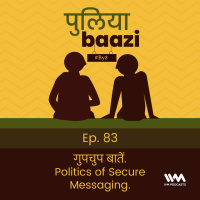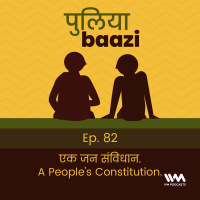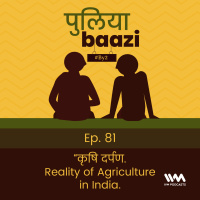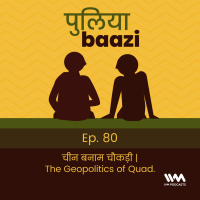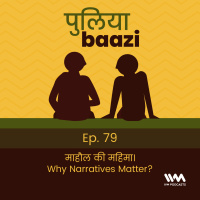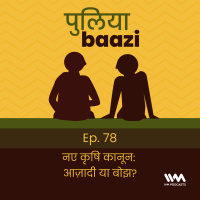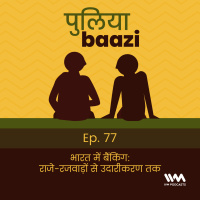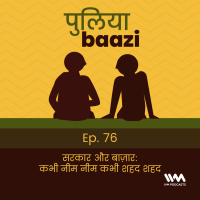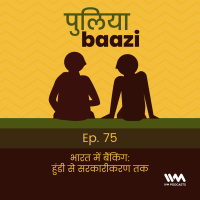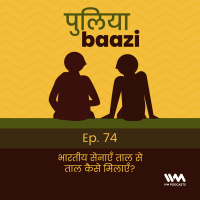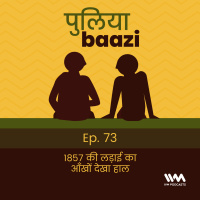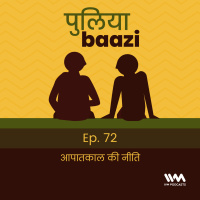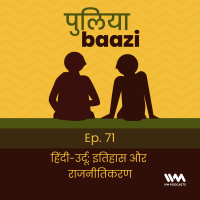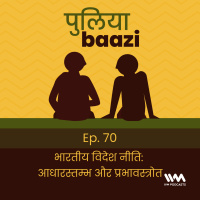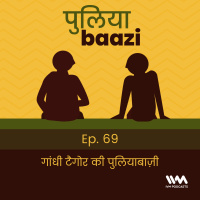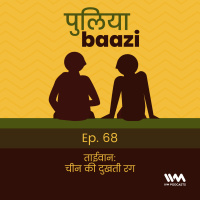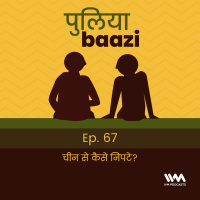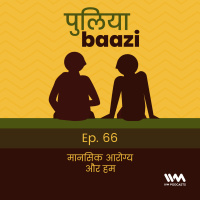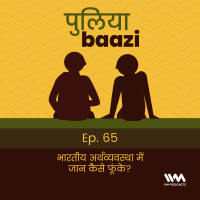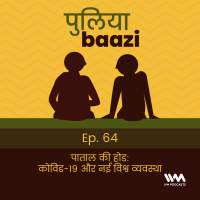Informações:
Sinopse
Podcast by Pranay Kotasthane and Saurabh Chandra
Episódios
-
गुपचुप बातें. Politics of Secure Messaging.
28/01/2021 Duração: 42minWhatsApp’s change in privacy policy attracted a lot of attention over the last couple of weeks. While some people migrated to Signal, most others ended up with all three -- WhatsApp, Telegram, and Signal -- on their phones. So in this #By2 episode, we discuss the narratives surrounding privacy in India. We also discuss if mandating interoperability of messaging platforms is a way out of the current situation. In the second section, we respond to two listeners’ questions on fiscal deficit and design thinking.व्हाट्सएप्प की प्राइवेसी नीति ने काफी हल्ला मचाया पिछले दो हफ़्तों में । तो इस #By2 एपिसोड में हम इसी मामले की तह तक जा रहे है । एपिसोड के दूसरे हिस्से में हमने अपने दो श्रोता - कृष्णा और राघव - के सवालों पर चर्चा की ।For more:What you need to know about Whatsapp’s new privacy policy, Shruti Dhapola, The Indian ExpressInteroperability as a tool for competition regulation, Ian BrownBudget Deficits and National Debt, LK Jha Memorial Lecture by Martin FeldsteinHow Trendsetters Shaped India’s Massive Sanitation
-
एक जन संविधान. A People’s Constitution.
21/01/2021 Duração: 01h16minContrary to some notions that the Indian Constitution is as an elitist document far removed from the Indian populace, the document in fact profoundly transformed everyday life of ordinary Indians, in mostly desirable and sometimes unintended ways. In this episode, Pranay and Saurabh speak to Rohit De (@itihaasnaama) — author of A People’s Constitution: The Everyday Life of Law in the Indian Republic on how ordinary Indians deployed constitutional provisions to restrain the government’s interference in their everyday lives. संविधान का एक आम भारतीय के आम जीवन पर क्या असर हुआ? इसी सवाल पर है यह पुलियाबाज़ी इतिहासकार रोहित दे के साथ। रोहित की किताब A People’s Constitution: The Everyday Life of Law in the Indian Republic चार ऐसे किस्से बयां करती है जहाँ नागरिकों ने अपने नए मूल अधिकारों का प्रयोग कर सरकार की रोज़मर्रा के जीवन में दखलंदाज़ी का विरोध किया। For more:Puliyabaazi episode #2: yeh republic kya bala haiPuliyabaazi special episode on the preambleRohit’s book: A People’s Constitution: The Everyday Life of Law i
-
“कृषि दर्पण. Reality of Agriculture in India.
14/01/2021 Duração: 01h09minIn the first Puliyabaazi #By2 episode, Saurabh and Pranay take stock of the state of agriculture in India. Saurabh talks about his encounters with agricultural markets and horticulture farming in Karnataka. In the second section of the podcast, the hosts respond to listener questions. पुलियाबाज़ी #By2 श्रृंखला के पहले अंक में सौरभ और प्रणय एक बार फिर कृषि क्षेत्र और लगातार चल रहे कृषि आंदोलन पर चर्चा कर रहे है | एपिसोड के अंत में सुनिए श्रोताओं के कुछ दिलचस्प सवालों पर पुलियाबाज़ी।For more:Puliyabaazi ep 78 with Gunwant PatilKarnataka government notifies Ordinance on opening up market for non-irrigated farm land, Economic TimesWhy Men Rebel, Book by Ted GurrThe Logic of Collective Action, Book by Mancur OlsonRadically Networked Societies, The Seen and The Unseen episode 158 Networked Protests & State Responses: The Case of Hong Kong 2019-20, Takshashila Discussion Document, Manoj Kewalramani and Rohan SethPuliyabaazi is on these platforms:Twitter: https://twitter.com/puliyabaaziFacebook: https://www.faceboo
-
चीन बनाम चौकड़ी | The Geopolitics of Quad.
07/01/2021 Duração: 01h23minAfter years of dilly-dallying, 2020 was the year when many states started working together to take on a common challenge: China. One such formation is the Quadrilateral Security Dialogue (Quad). Though established in 2008, it’s only over the last couple of years that the grouping has started engaging more fruitfully. In this puliyabaazi, Indrani Bagchi, Diplomatic Editor at Times of India, takes an in-depth look at the prospects and challenges for this grouping. We also discuss India’s bilateral relationships with the other three Quad countries. पिछले साल अंतर्राष्ट्रीय राजनीति में एक बड़ा बदलाव यह आया कि कई देश चीन की मग़रूर हरकतों के ख़िलाफ़ खुलकर बोलने लगे और अपने आपसी मतभेदों को एक तरफ रख, साथ मिलकर काम करने में दिलचस्पी दिखाने लगे। क्वाड - मतलब भारत, अमरीका, जापान, और ऑस्ट्रेलिया की चौकड़ी - ने भी इस साल कई महत्त्वपूर्ण कदम उठाए। तो क्या है ये चौकड़ी और इससे भारत को क्या फायदा होगा? इसी विषय पर पुलियाबाज़ी टाइम्स ऑफ इंडिया की डिप्लोमैटिक एडिटर इन्द्राणी बागची के साथ।For more:Corona, and wolf warriors: The wor
-
माहौल की महिमा। Why Narratives Matter?
24/12/2020 Duração: 01h10minNarratives are all around us. Whether it's policy, politics, or the economy, the stories we tell and listen matter. In this Puliyabaazi, we discuss why narratives have the power to make the unreal real with economic historian and assistant professor at IIM Bangalore, Prateek Raj (@PrateekRaj_). आजकल “नैरेटिव” का बोलबाला है. हर कोई नए तरीकों से कहानियाँ बुन रहा है - भले ही उसका तथ्य से कोई वास्ता हो या नहीं. इस शब्द का मतलब क्या है और नैरेटिव हमारी अर्थव्यवस्था और राजनीति पर क्या असर करते है, ऐसे ही कुछ सवालों पर पुलियाबाज़ी आर्थिक इतिहासकार प्रतीक राज के साथ.For more:Can Narratives Shape Society?, ProMarket, by Prateek RajA Brief history of the Marketplace of Ideas, Milken Review, by Prateek RajA Culture of Growth: The Origins of the Modern Economy, a book by Joel MokyrBourgeois Trilogy book series by Dierdre McCloskeyPuliyabaazi is on these platforms:Twitter: https://twitter.com/puliyabaaziFacebook: https://www.facebook.com/puliyabaaziInstagram: https://www.instagram.com/puliyabaazi/Subscribe & listen to
-
नई कृषि कानून : आज़ादी या बोझ? The New Farm Laws.
10/12/2020 Duração: 01h24minWhat do the recent changes in agricultural laws mean for farmers? Will these changes unshackle the agricultural sector or do the problems lie elsewhere? We discuss these questions and more with Gunwant Patil, leader of the Shetkari Sangathana Movement and a farmer himself. आजकल चल रहे कृषि आंदोलन के क्या कारण है? क्या यह कानून कृषि क्षेत्र में समृद्धि लाने में सक्षम है? इसी विषय पर ये पुलियाबाज़ी शेतकरी संघटना के लीडर गुणवंत पाटिल के साथ | For more:Gunwant Patil’s Manthan talkA profile of the Shetkari Sanghatana movementGunwant Patil’s episode on The Seen and the UnseenAgricultural Economist Ashok Gulati on the farm laws, Indian ExpressPuliyabaazi is on these platforms:Twitter: https://twitter.com/puliyabaaziFacebook: https://www.facebook.com/puliyabaaziInstagram: https://www.instagram.com/puliyabaazi/Subscribe & listen to the podcast on iTunes, Google Podcasts, Castbox, AudioBoom, YouTube, Spotify or any other podcast app.See omnystudio.com/listener for privacy information. This is a public episode. If yo
-
भारत में बैंकिंग : राजे-रजवाड़ों से उदारीकरण तक. History of Indian Banking Part 2.
26/11/2020 Duração: 01h14minIn this second and final episode on India’s banking system, we pick up some more interesting strands of India’s monetary history. We are joined again by Amol Agrawal (@mostlyeconomics), Assistant Professor at Amrut Mody School of Management, Ahmedabad University. In episode #75, Amol began with the Hundi system in India and ended at the nationalisation phase of 1969. In this episode, we find out the banking systems in the princely states, government-mandated efforts for financial inclusion, and recent developments on banking reforms.भारत में बैंकिंग पर दूसरे और अंतिम एपिसोड में एक बार फिर अमोल अग्रवाल (@mostlyeconomics) कई रोचक किस्से सुना रहे है | आज़ादी से पहले की पाँच सौ से ज़्यादा रियासतों में बैंकिंग कैसे होती थी? आज़ादी बाद वित्तीय समावेशन के लिए क्या कदम उठाए गए और किस हद तक ये सफल हो पाए? ऐसे ही कुछ सवालों पर एक और पुलियाबाज़ी|For more:Puliyabaazi episode #75 feat. Amol AgrawalRBI’s Annual Reports from 1936 to 1999There were 54 Princely State banks in 1950s, Mostly EconomicsPriority Sector Loans: A histor
-
सरकार और बाज़ार : कभी नीम नीम कभी शहद शहद. State-Corporate Relations in India.
12/11/2020 Duração: 01h20minIn this episode, political scientist and economic historian Rohit Chandra (@rohitreads) gives an account of business-state relations in India over the last two decades. In this wide-ranging conversation, we discuss trends of market concentration since 2014, the state of public sector units, small businesses, and the state of banking among other things. Rohit, together with Rahul Verma (@rahul_tverma), has curated the Seminar Magazine Symposium for October 2020 on the topic A delicate balance: a symposium on untangling business-state relations in India.भारत में सरकार और बिज़नेस के रिश्ते कैसे बदले है पिछले दो दशकों में, यही है विषय इस पुलियाबाज़ी का | क्यों भारत में बिज़नेस केन्द्रीभूत हो रहे है? भारत के छोटे उद्योग छोटे ही क्यों रह जाते है? “सूट-बूट की सरकार” टिप्पणी को क्या इस सरकार ने दिल से लगा लिया? ऐसे ही कुछ सवालों पर चर्चा की हमने आईआईटी दिल्ली की स्कूल ऑफ़ पब्लिक पॉलिसी में असिस्टेंट प्रोफेसर रोहित चंद्र से, जो इस विषय के आर्थिक इतिहास पर काफ़ी वर्षों से अध्ययन कर रहे है |For more:Seminar Magazine Symposiu
-
भारत में बैंकिंग : हुंडी से सरकारीकरण तक. History of Indian Banking Part 1.
29/10/2020 Duração: 01h19minWhat’s the history of banking in India? Do bank deposits lead to bank loans or is it the other way around? Why did coastal Karnataka spring up so many private banks?In this episode, Amol Agrawal (@mostlyeconomics), Assistant Professor at Amrut Mody School of Management, Ahmedabad University, gives us a tour de force of the history of banking in India. Amol also runs Mostly Economics, one of India’s foremost blogs on economics and economic history. एक बैंक की असली परिभाषा क्या है? भारत में मॉडर्न बैंकिंग कब और कैसे आई? क्या भारत में हमेशा से ही ज़्यादातर बैंक सरकार द्वारा संचालित थे? १९६९ में बैंक सरकारीकरण क्यों हुआ? इस पुलियाबाज़ी में आपको मिलेंगे इन सब सवालों के जवाब अमोल अग्रवाल से जिन्होंने भारत के बैंकिंग इतिहास का बारीकी से अध्ययन किया है | For more:Mostly Economics -- Amol’s blog Money Creation in the Modern Economy by McLeay et al on what comes first, deposits or loans?RBI’s Annual Reports from 1936 to 1999Before Thaler there was Pai -- Amol’s article in Mint on Pigmy Deposits of Syndicate BankHistory o
-
भारतीय सेनाएँ ताल से ताल कैसे मिलाएँ? Jointness in India's Armed Forces.
15/10/2020 Duração: 01h04minEven today, India’s armed forces largely conduct their operations in silos. It is for this reason that the Chief of Defence Staff position was created and specifically mandated to create integrated theatre commands that would allow systematic cooperation of all three forces in large numbers during war. So in this Puliyabaazi, we are joined by Lt Gen (Dr) Prakash Menon to discuss jointness in India’s military. एयरफोर्स, नेवी, आर्मी - यह तीनों सेनाएँ भारत में आज भी काफी हद तक अपनी अपनी अलग धुन पर चलती हैं | लेकिन आज के युद्धों में इन सेनाओं का ज़्यादा से ज़्यादा तालमेल अनिवार्य हो गया है| इस उद्देश्य के लिए ही हाल ही में भारत सरकार ने चीफ ऑफ़ डिफेन्स स्टाफ (CDS) पद का गठन किया है | तो इस मिलिट्री पुलियाबाज़ी में हमने इसी सैन्य तालमेल पर चर्चा की लेफ्टिनेंट जनरल प्रकाश मेनन से|Readings:India’s Theatre Command System: A Proposal, Takshashila Discussion Document, by Lt Gen Prakash MenonThe Four Aspects of Joint, Aaron P JacksonPuliyabaazi is on these platforms:Twitter: https://twitter.com/puliyabaaziFacebook: https://
-
1857 की लड़ाई का आँखों देखा हाल. An Eyewitness Account of the 1857 War.
01/10/2020 Duração: 01h09minIt’s rare to find a narration of earthshaking political events by a commoner of those times. That’s precisely why Vishnu Bhat Godse Varsaikar’s Maazaa Pravaas is special. This book provides an eyewitness account of the 1857 mutiny. In this puliyabaazi, we discuss a few counter-intuitive and lesser-known facts from that era based on Varsaikar’s account. १८५७ की लड़ाई से हर भारतीय कुछ हद तक तो वाक़िफ़ ज़रूर है | कुछ लोगों ने इसे ग़दर कहा तो कुछ लोगों ने इसे आज़ादी की पहली जंग की उपाधि दी | लेकिन इस लड़ाई का आँखों देखा वर्णन मिल जाए तो? ऐसा ही कुछ हमें विष्णु भट्ट वरसैकर की नायाब किताब ‘माझा प्रवास’ में देखने मिलता है | तो इस पुलियाबाज़ी में हमने इस किताब की मदद से १८५७ के भारत की राजनीति, समाज, और रहन-सहन समझने की कोशिश की | Readings:1857: The Real Story of the Great Uprising, translation by Mrinal PandeMaazaa Pravaas (Marathi) by Vishnubhatt GodseAdventures of a Brahmin Priest: My Travels in the 1857 Rebellion - Mazha Pravas, translation by Priya Adarkar and Shanta GokhalePuliyabaazi is on these platforms:Twitter: ht
-
आपातकाल की नीति. Social Protection in India.
17/09/2020 Duração: 01h24minIndian governments run hundreds of policies in the name of social protection. Given the adverse economic impact of COVID-19, the focus is back on these policies to provide some relief to the worst-affected. So this episode is all about understanding social protection policies better. Joining us is Saksham Khosla (@khoslasaksham), Associate Consultant at Dalberg.सामाजिक सुरक्षा क्या है? भारत की सरकारों के खर्च का कितना हिस्सा सामाजिक सुरक्षा विषयों पर किया जाता है? यह PDS, UBI, ICDS, नरेगा वगैरह का उद्देश्य क्या है? यह सवाल ख़राब अर्थव्यवस्था के चलते और भी प्रासंगिक गए है | इन नीतियों को समझा रहे है सक्षम खोसला, जो कि डालबर्ग में एसोसिएट कंसलटेंट है |Readings:Himanshu and Abhijit Sen's 2013 paper on the PDS' impact on poverty Himanshu and Abhijit Sen's 2013 paper on the PDS' impact on nutritionSudha Narayan on MGNREGASandip Sukhtankar on MGNREGAIndiaspend on malnutrition data in IndiaDalberg's survey on the efficacy of government entitlements for low-income families during COVID-19Reetika Khera, Jean Drèze, and
-
हिंदी-उर्दू : इतिहास और राजनीतिकरण. Hindi Urdu Unity.
03/09/2020 Duração: 01h28minThis Puliyabaazi is a deep dive on the Hindi language - the origins, relationship with Urdu and Sanskrit, and about concerns over its imposition. We are joined by Abhishek Avtans (@avtansa), a linguist and lecturer of Hindi at Leiden University. Abhishek also gives a fascinating account of the politics of language in India. यह है पुलियाबासी पुलियाबाज़ी की जुबां पर | अभिषेक अवतंस (@avtansa), भाषावैज्ञानिक और लीडेन यूनिवर्सिटी में हिंदी शिक्षक, दे रहे है एक मास्टरक्लास हिंदी के इतिहास और राजनीतिकरण पर | अभिषेक से हमने चर्चा की कई भाषा सम्बंधित कई ज्वलंत मुद्दों पर:क्या जो हिंदी आज बोली जाती है वह खड़ी बोली का एक विकसित रूप है?उर्दू-हिंदी - क्या इन दोनो को अलग अलग भाषा मानना चाहिए?सरकारी भाषा बनने से हिंदी पर क्या असर पड़ा है?इंटर्नेट के आने से हिंदी में कुछ बदलाव आया है क्या? इंटर्नेट के आने से हिंदी का फैलाव बढ़ा है या घटा है? भाषा पर राजनीति तो काफ़ी पुरानी है। भाषा के प्रति भक्ति होना ठीक है क्या? अगर एक भाषा का पतन हो भी जाए तो क्या फ़रक पड़ता है?Readings:Abhishek’s blog on linguistics and Hindi https://avt
-
भारतीय विदेश नीति : आधारस्तम्भ और प्रभावस्रोत. India's Foreign Policy Principles.
20/08/2020 Duração: 01h07minWhy is India’s foreign policy the way it is? What are the principles and interests underlying India’s relationship with the world? What influence has the colonial rule had over India’s foreign policy conduct? Listen in to this puliyabaazi on foreign policy with Dr Aparna Pande (@Aparna_Pande) to find out. Aparna is Director, Initiative on the Future of India and South Asia, at the Hudson Institute, US. She’s the author of two books on India’s foreign policy — From Chanakya to Modi and Making India Great.भारत की विदेश नीति जैसी है वैसी आखिर है क्यों? इसी सवाल पर अगली पुलियाबाज़ी अपर्णा पाण्डे के साथ जिसमें हमने चर्चा की भारतीय विदेश नीति के कुछ प्रमुख आधारस्त्मंभों पर| अपर्णा अमरीका के थिंकटैंक हडसन इंस्टिट्यूट में भारत और दक्षिण एशिया पर रिसर्च करती है और भारतीय विदेश नीति पर दो किताबें लिख चुकी है| Readings:Making India Great, Book by Aparna PandeFrom Chanakya to Modi, Book by Aparna PandePuliyabaazi is on these platforms:Twitter: https://twitter.com/puliyabaaziFacebook: https://www.facebook.com/puliyabaaziIn
-
गांधी टैगोर की पुलियाबाज़ी. The Gandhi Tagore Debates.
06/08/2020 Duração: 01h10minBetween 1915 and 1941, Gandhi and Tagore wrote many letters to each other freely expressing viewpoints and often disagreeing with each other on core issues such as nationalism, charkha, reason, and swaraj. Eight decades later, these discussions are still relevant in understanding India better. Not only are the debates engaging, they are also a lesson in expressing disagreements in a civil, cordial, and respectful manner. So this puliyabaazi is about the Gandhi-Tagore puliyabaazi. Saurabh and Pranay pick themes up from this treasure trove and shed light on their two perspectives.महात्मा और गुरुदेव, गांधी और टैगोर | भारत की यह दोनों महान हस्तियां भारतीय संस्कृति की वैचारिक विविधता की परिचायक है | १९१५ से लेकर १९४१ के बीच दोनों ने एक दूसरे को कई ख़त लिखे जिसमें उन्होंने अपने-अपने मत को रखते हुए एक-दूसरे से राष्ट्रवाद, असहयोग आंदोलन, चरखा, तर्क इत्यादि जैसे मूल विषयों पर असहमति व्यक्त की| तो ये पुलियाबाज़ी गांधी और टैगोर की पुलियाबाज़ी पर |Readings:The Mahatma and the Poet, Compiled and Edited by Sabyasachi Bhattac
-
ताईवान : चीन की दुखती राग. Understanding Taiwan.
23/07/2020 Duração: 01h11minChinese Taipei. Republic of China. Taiwan. All refer to the same country that has stood up to the People’s Republic of China’s arrogance in recent years. So in this episode, we discuss all things Taiwan with Sana Hashmi (@sanahashmi1), Taiwan Fellow at the National Chengchi University and a scholar of Chinese Foreign Policy. In this conversation, we discuss: What are the similarities and differences between the People’s Republic of China (PRC) and the Republic of China (ROC, Taiwan)? What has the contribution of the US been in the Taiwanese economy?What should India’s foreign policy towards Taiwan be like? ताईवान के बारे में भारत में रूचि बढ़ रही है और दूसरी ओर पिछले कुछ वर्षों से ताईवान और पीपल्स रिपब्लिक ऑफ़ चाइना के बीच की दरार बढ़ती जा रही है | तो इस एपिसोड में हमने ताईवान के सरकार, समाज, और बाज़ार पर चर्चा की सना हाशमी (@sanahashmi1) के साथ| सना एक विदेश नीति विशेषज्ञ है और ताईवान के नेशनल चेंगची यूनिवर्सिटी में भारत-ताईवान संबंधों पर रिसर्च कर रही है |Readings:It is time for India to invest in ties with Tai
-
चीन से कैसे निपटे? How to Address the China Threat.
09/07/2020 Duração: 01h01minषि जिनपिंग-संचालित चीन के अहंकार को तोड़ने के लिए भारत के पास क्या विकल्प है? चीनी कम्पनी के ऐप्प बैन करने के कदम के क्या फ़ायदे-नुक़सान है? आर्थिक क्षेत्र में चीन से लड़ाई में कितनी समझदारी है? इन्हीं सवालों पर सुनिए पुलियाबाज़ी सौरभ और प्रणय के साथ| What are India’s options against the People’s Republic of China’s arrogance? What are the costs and benefits of banning apps of Chinese companies? Can economic power be exercised to hurt China without incurring significant costs? Saurabh and Pranay tackle these questions in the next episode.Readings:China’s arrogance and the logic of strategy, by Pranay KotasthaneAn Indian Approach to Navigate China’s Rise, by Manoj Kewalramani et alIndia can resist China by acting in concert with its adversaries, Mint, by Nitin PaiCan India and China Fight and Trade?, All Things Policy episode #355Puliyabaazi is on these platforms:Twitter: https://twitter.com/puliyabaaziFacebook: https://www.facebook.com/puliyabaaziInstagram: https://www.instagram.com/puliyabaazi/Subscribe & lis
-
मानसिक आरोग्य और हम. Importance of Mental Health.
25/06/2020 Duração: 01h22minIn this episode, we spoke to Manoj Chandran (@manoj1chandran), CEO of White Swan Foundation — a not-for-profit organisation that offers knowledge services in the area of mental health. Manoj busts many myths about mental health, and illness. Going beyond the clinical aspects, Manoj talks about the role of individuals, society, and the state, in improving mental health. मानसिक आरोग्य और शारीरिक आरोग्य के बारे में हमारी धारणाएँ काफ़ी अलग है | ये ग़लत धारणाएँ अक्सर मानसिक रोग की चिकित्सा में आड़े आ जाती हैं | तो इस एपिसोड में हमने पुलियाबाज़ी की मनोज चंद्रन (@manoj1chandran) से जो कि मानसिक आरोग्य के बारे में सही ज्ञान को समाज तक पहुंचाने का प्रयास कर रहे है | मनोज वाइट स्वान फ़ाउंडेशन फ़ॉर मेंटल हेल्थ के सीईओ है | इस गैरलाभकारी संगठन ने मानसिक स्वास्थ्य के क्षेत्र में उपलब्ध ज्ञान और जानकारी को लोगों तक पहुंचाने का बीड़ा उठाया है|Readings:White Swan Foundation’s mental health knowledge updates in HindiWebinar on COVID-19 and mental health: Building resilience in the IT industryWebinar on COVID-19 and mental health:
-
भारतीय अर्थव्यवस्था में जान कैसे फूकें? Reviving the Indian Economy.
11/06/2020 Duração: 59minIn this episode, we discuss India’s economic trajectory before, during, and after COVID-19 with Ajit Ranade, Senior Fellow at the Takshashila Institution. Ajit talks about the factors that derailed the Indian economy and suggests concrete actions that Indian governments can take to bounce back from the economic crisis. Listen in!इस एपिसोड में चर्चा भारतीय अर्थव्यवस्था पर जाने-माने अर्थशास्त्री अजीत रानडे के साथ. अजीत तक्षशिला इंस्टीटूशन में सीनियर फेलो है और उनके अर्थव्यवस्था पर लेख भारत के लगभग हर प्रमुख अंग्रेजी अखबार में छपते रहते है | अजीत के साथ इस पुलियाबाज़ी में कोविड-१९ के पहले, कोविड-१९ के दौरान, और कोविड-१९ के बाद की अर्थव्यवस्था पर चर्चा की| Readings:4Rs to resolve the bank crisis, Economic Times Article by Kshitij AnandAn out-of-the-box solution for India’s stimulus problem, Livemint, Ajit RanadeThe big funding challenge that small businesses face, Livemint, Ajit RanadeWe need more than just liquidity, Mumbai Mirror, Ajit RanadeWhat are China’s weak points, Mumbai Mirror, Ajit RanadePuliyabaazi is
-
पाताल की होड़ : कविड 19 और नई विश्व व्यवस्था. Post-pandemic World Order.
28/05/2020 Duração: 01h25minIn this episode, we discuss how COVID-19 is likely to affect geopolitical and geoeconomic trends. Pranay and Saurabh discuss how the world might change due to the COVID-19 pandemic, how this new world order will affect India, the domestic policy reforms needed to prosper in this world, and India’s foreign policy outlook for a changed world.कोविड-19 की वजह से विश्व व्यवस्था में कई बड़े बदलाव आ रहे हैं | आर्थिक तौर पर सरकारें “आत्मनिर्भरता” का नारा फिर से उठा रही हैं जबकि राजनैतिक तौर पर चीन के अक्खड़पन के खिलाफ कई देश ठोस कदम उठा रहे है | तो इसी बदलती विश्व व्यवस्था पर चर्चा प्रणय और सौरभ के साथ |Readings:1. Takshashila Discussion SlideDoc by Pranay Kotasthane, Akshay Alladi,Anirudh Kanisetti, Anupam Manur on India in the Post COVID-19 World Order (https://takshashila.org.in/takshashila-discussion-slidedoc-india-in-the-post-covid-19-world-order/)2. Takshashila Discussion Document on ‘India’s Strategies for a New World Order’ (http://takshashila.org.in/wp-content/uploads/2018/07/TDD-Indias-Strategies-New-World-Or

